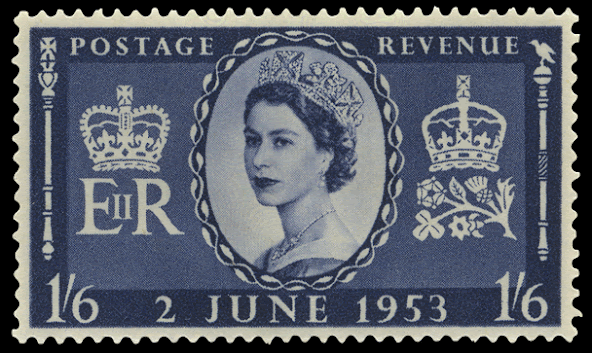This article was first published in June 2022, to mark the Platinum Jubilee of Her Majesty Queen Elizabeth II. It has been slightly amended to reflect the news of the Queen's death.
A young girl sits on the floor of a neighbour’s living room, larger than her small council house one, watching a little black and white flickering TV screen, while the atmosphere buzzes with excited neighbours crowding round. It is the only place in the street they can watch it after all.
She sits enraptured like the other children, silently enjoying a chocolate. A special treat from her ration book.
The Coronation of Her Majesty Queen Elizabeth II in 1953, as seen through the eyes of a child in the UK. A fulfilment of her accession to the throne the previous year, and the beginning of a reign that has both borne witness to, and been a part of, significant transformations of British society.
The Importance of Youth
Youth was something of particular importance to the late Queen, her first ever public broadcast, as Princess Elizabeth, a 1940 wartime radio address to the children of the Commonwealth.
Even prior to the Coronation, the importance of engaging with youth was a sentiment echoed as the late Queen in her first Christmas broadcast, 1952 telling her audience:
"Above all, we must keep alive that courageous spirit of adventure that is the finest quality of youth; and by youth I do not just mean those who are young in years; I mean too all those who are young in heart, no matter how old they may be.”
These words were against the backdrop of a Britain seeking its way in an uncertain changing world, of growing economic prosperity and news headlines filled with technological breakthroughs both fascinating and terrifying to children in classrooms, from pioneering jet passenger aircraft and the thoughts of global flight to detonation of the UK’s first atomic bomb in 1952.
At the same time, this backdrop was also one of an austere Britain, barely seven years after the ravages of World War 2, scars in such everyday rituals as food rationing, children forming fresh memories of playing around still bomb-damaged buildings, many living silently with unspeakable traumas of conflict, and families watching their young men still being conscripted to serve overseas in the armed forces for 18 months (something which would continue to be required until 1960).
Effects of extreme weather were as much a challenge in the 1950s. The Great Smog in December 1952 killed thousands of people in London, while the Great North Sea flood of 1953 forced over 30,000 people across Scotland and England out of their homes.
Snapshots of changes convey something of the starkness in the transformation of Britain. Black and white television sets only existed in a small fraction of early 1950s households, the single BBC channel making choices of what to watch all the easier!
Daily radio programmes and newspapers remained the main source for home information consumption, while cinemas were the primary experience people had of moving pictures.
Transformative
The Coronation itself was transformative of engagement with TV, people excitedly crowding into homes, over 27 million tuning in from the UK alone.For many, it was the first time they would have ever watched TV, even more remarkable when considering that, by the end of 1952, only a small percentage of households had a set, rising sharply during the decade.
The televising of this ceremony, and of Royal and national events more generally, something now taken for granted, was also very much contested at the time, BBC plans initially being regarded with much scepticism.
Women in Power
As well as wowing a population through this televisual spectacle, the late Queen’s accession to the throne, was also significant in a society not used to seeing women in positions of power, particularly at a time when they had yet to become television newsreaders (1956) or even local bank managers (1958).This speed of ideas being transmitted has also fundamentally reshaped the UK and relationships of people within it, younger and older.
The 1950s was one of large rotary dial phones in those households which had them, distinctive red phone boxes taking coins which most had to walk to if they wanted to call, or more likely the wait of letters, which could take days or (internationally) weeks to reach their destination. The contrast with near instantaneous messaging devices of today is often hard to conceptualise. The late Queen experienced these changes in their pioneering stages, being the first Head of State in the world to send an email in 1976.
Commercial Jet Air Travel
Although Britain had long been connected to the world, the speed and frequency of travel itself similarly accelerated remarkably. 1952 marked the beginning of commercial jet air travel, pioneered by the UK with the first commercial jet aircraft, the De Havilland Comet.Barely a few weeks after the Coronation, the late Queen, Queen Mother, and Princess Margaret would be flying on the Comet. In 1950, only two million passengers went through British airports, a number increasing to more than 200 million by 2010.
The Commonwealth
Transformations above are also mirrored in the UK and the late Queen’s relations globally, particularly with the Commonwealth. Changes in this institution reflect both decolonisation, many of Britain’s colonies in Africa only achieving independence during the 1950s and 1960s, alongside growing UK diversity amid challenging legacies of empire.One estimate suggests that, in stark contrast to the over 7.3 million in 2018 with a BAME background in the UK, around 13.8% of the population, this number was barely 20,000 residents in the UK in 1950.
The Royal Walkabout
The visibility and accessibility of celebrities to their fans is very much something we take for granted, including of the monarchy, but the first public walkabout by the late Queen was not until 1970, beginning during a visit to Sydney, Australia.
Connecting with people in this relatively ‘new’ tradition of a thousand-year monarchy is something which has been continued by herself and by other members of the Royal Family over countless events to the present day, reflecting a greater sense of visibility and of those societal changes in how we ‘connect’.
Perhaps this experience of youth (however defined) in a rapidly changing Britain is best summed up by the late Queen’s words, akin to her 1952 message, when, in 2021, she graciously rejected the Award for Oldie of the Year, stating “you are only as old as you feel”.
Connecting with people in this relatively ‘new’ tradition of a thousand-year monarchy is something which has been continued by herself and by other members of the Royal Family over countless events to the present day, reflecting a greater sense of visibility and of those societal changes in how we ‘connect’.
Perhaps this experience of youth (however defined) in a rapidly changing Britain is best summed up by the late Queen’s words, akin to her 1952 message, when, in 2021, she graciously rejected the Award for Oldie of the Year, stating “you are only as old as you feel”.








